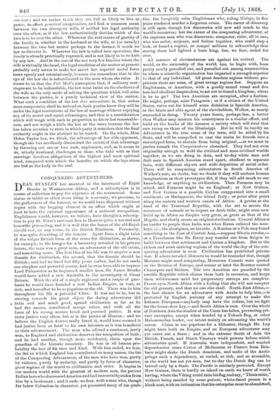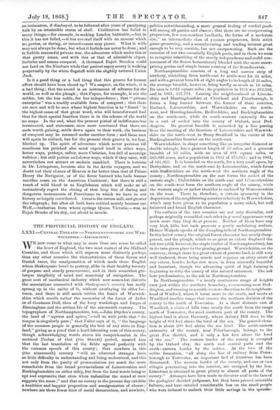CONQUERING ADVENTURERS.
DEAN STANLEY has assented to the interment of Rajah Brooke in Westminster Abbey, and a subscription is in course of collection to pay the expenses of the ceretnouial. Some statue or tablet or other stone thing is necessary, we presume, to the perfectness of the honour, or we could have dispensed without regret with the begging element in an affair which ought at least to have the external appearance of a national recognition. Englishmen would, however, we believe, have thought a subscrip- tion to pay St. Peter's entrance fees to Heaven quite a natural and honorific proceeding, and it is well that the bones of the old Rajah should rest, on any terms, in the British Pantheon. Personally, he was quite deserving of the honour. Apart from a slight taint of the vulgar British form of the crave for distinction, as shown, for example, in the hunger for a baronetcy revealed in his private letters, the man was a great- man, an adventurer of the old strain, and something more. The first idea of his life was to acquire a new domain for civilization, the second, that the domain should be British ; and had he lived but fifty years earlier, had he not made one sleepless and powerful enemy, had he even been able to impress Lord Palmerston as he impressed smaller men, Sir James Brooke would have added a new Australia to the sovereignty of Great Britain. With the aid of a single regiment and a couple of gun- boats he would have founded a new Indian Empire, as vast, as rich, and hereafter to be as populous as the old. There was in him throughout his life a potential Clive. It was not to be, but in striving towards his great object the daring adventurer did
. little evil and much good, spread civilization as far as he had the means, conciliated savage tribes, and with, all the force of his strong nature loved and pursued justice. It was stern justice very often, but so is the justice of Heaven ; and we believe the English Cortez really loved it, would have secured it bad justice been as fatal to his own interests as it was beneficial to their advancement. The man who offered a continent, justly won, to England and civilization deserves the recognition of both ; and he had another, though more accidental, claim upon the guardian of the historic cemetery. He was in all human pro- bability the last of his race and kind. With him ended, we fear, the list to w bleb England has contributed so many names, the list of the Conquering Adventurers, of the men who have won, partly by violence, partly by audacity, and partly by force of character, great regions of the world to civilization and order. It begins in our modern world with the greatest of modern men, the patient Italian hero who discovered America and had immortality stolen from him by a lieutenant ; and it ends, we fear, with a man who, though far below Columbus in character, yet possessed many of his quali- ties, the haughtily calm Englishman who, ruling Malays, in five years rendered murder a forgotten crime. The career of discovery is still open, though few discoveries will now add much to the world's resources; but the career of the conquering adventurer, of the supreme man who was discoverer, conqueror, ruler, all in one, who was sailor, serjeant, and Sultan together, who could stop a leak, or found a capital, or compel millions to acknowledge that among them had lighted a born king, has, we fear, ended for ever.
All manner of circumstances are against his revival. The world, or the ownership of the world, has, to begin with, been pretty nearly parcelled out, and parcelled out among communities to whom a scientific organization has imparted a strength superior to that of any individual. Of great desolate regions without pro- prietors there are none, of great savage regions few. Suppose an Englishman, or American, with a goodly armed vessel and five hundred obedient desperadoes, to set out to found a kingdom, where is he to go ? The two Americas are occupied, after a fashion. He might, perhaps, seize Patagonia ; or if a citizen of the United States, carve out for himself some dominion in Spanish America, as the brave and able agent of the shareholders, Walker, so nearly succeeded in doing. Twenty years hence, perhaps less, a better than Walker may interest his countrymen in a similar effort, and build on the banks of the Amazon a society which will rival that now rising on those of the Mississippi. But he will be hardly an Adventurer in the true sense of the term, will be aided by his State, and will be compelled to cast the realm he founds into a stereotyped form, to abstain from being original,—as we must in justice remark the Conquistadores abstained. They had not even originality enough to weld the civilized and semi-civilized worlds together, as we are doing in Asia, and to-day white man and dark man in Spanish America stand apart, obedient to separate laws, with different objects and wide disparities of social order. There will be conquering adventurers in South America of Walker's sort, no doubt, but we doubt if they will enchain human imaginations as their prototypes did, if they will add much to our knowledge, or anythiag to civilization. Then Formosa may be seized, and Formosa might be an England ; or New Guinea, and New Guinea is a possible Ceylon exaggerated into a small continent; or Madagascar, the island Italy ; or point after point along the eastern and western coasts of Africa. A genius at the head of the Transvaal Republic, with the art to secure the reverence of nomads or to import an Arab tribe, might even now build up in Africa an Empire very great, as great as that of the Moguls, and slowly create an original civilization. Central Africa is no harder to people than India was when Rama enlisted the mon- keys, i.e., the aborigines, on his side. A Russian or a Pole may found something in the East of Central Asia,—suppose Siberia revolts,— or a Frenchman like De Bussy may wander out from Saigon to build between that settlement and Canton a kingdom. But in the richest and most enticing regions of the world the day of the con- quering adventurer is over. Civilization has prohibited private war. If a hero invaded Morocco lie would be reminded that, though Morocco might need conquering, Moroccan Consols were quoted on the Bourses of Europe, and sooner or later the Bourses control Chassepots and Sniders. The two Americas are guarded by the terrible Republic which claims them both in reversion, and keeps them wildernesses until her preparatory surveys are complete. France eyes North Africa with a feeling that she will not conquer the old granary, and that no one else shall. North-East Africa,— the best chance for an adventurer with Arabs to help him,—is protected by English jealousy of any attempt to make the Isthmus European—anybody may have the cellars, but we fight for the house-door key,— and South Africa is ours. Over the whole of Northern Asia the shadow of the Czars has fallen, preventing pri- vate enterprise, except when headed by a Yakoob Beg, or other Mahommedan leader, not intent mainly on advancing the world's career. China is too populous for a filibuster, though Mr. Lay might have built an Empire, and an European adventurer may yet carve out a State ; and in the extreme South of Asia the British, French, and Dutch Viceroys wield powers before which adventurers quail. If Australia were independent, and wanted dependencies some Cortez of Melbourne or Pizarro from Bris- bane might shake the Dutch dominion, and make of the Archi- pelago such a dependency, so varied, so rich, and so accessible, as the world has not yet seen, but to-day the Dutch Rag can be braved only by a State. The Pacific is similarly protected. Except New Guinea, there is hardly an island on earth we know of worth having, where the Viking could raise hisfiag, and say, "Thisis mine," without being assailed by some patient, white-faced person in a black coat, with an intimation that his enterprise must be abandoned,
an intimation, if disobeyed, to be followed after years of paralyzing talk by an irresistible storm of shell. Civilization has failed in many things,—for example, in making London habitable,—but in this it has not failed,—it has covered itself with an armour which no genius, or daring, or inventiveness may pierce. What it wills may not always be done, but what it forbids can never be done ; and it forbids successful private war, the adventure which under this or that pretty name, and with this or that of admissible object, includes and means conquest. A thousand Rajah Brookes could not land on the Nicobars while that patient sepoy sentry is walking perpetually by the white flagstaff with the slightly tattered Union -Jack.
Is it a good thing or a bad thing that this groove for human -effort should have been closed up ? We suspect, on the whole, it is a bad thing ; that the sword is an instrument of advance for the world, as well as the plough ; that Papua, for example, is not the nobler, but the less noble, for her independence ; that "private .enterprise" was a readily available form of conquest ; that there .are men and will be men whose highest function is to "found" in the highest sense of that great word, who will henceforward find that for their special function there is in the scheme of the world am scope. In the end, when the present period of indifference has terminated, and statesmen, once more convinced that there are .ends worth gaining, settle down again to their work, the business of conquest may be resumed under another form ; and these men will again be utilized, but for the present their groove is, we fear, blocked up. The spirit of adventure which never perishes till manliness has perished also must expend itself in other ways, better ways, perhaps, softer, more Christian, less full of sovereign 'volition; but still pettier and slower ways, which if they raise, will nevertheless not attract or enchain mankind. There is heroism in Dr. Livingstone, heroism also in the Arctic voyagers, and we -doubt not their chance of Heaven is far better than that of Prince Henry the Navigator, or of the fierce bastard who bade human .sacrifice cease on the American Continent; but there is still a touch of wild blood in us Englishmen which will make us all instinctively regret the closing of that long line of daring and -dangerous instruments of Providence to which we have in our history so largely contributed. Greatis the cotton mill, and greater the telegraph ; but after all both have arrived mainly because one Welf,—barbarian from whom springs Queen Victoria,—was, as Rajah Brooke of his day, not afraid to invade.































 Previous page
Previous page